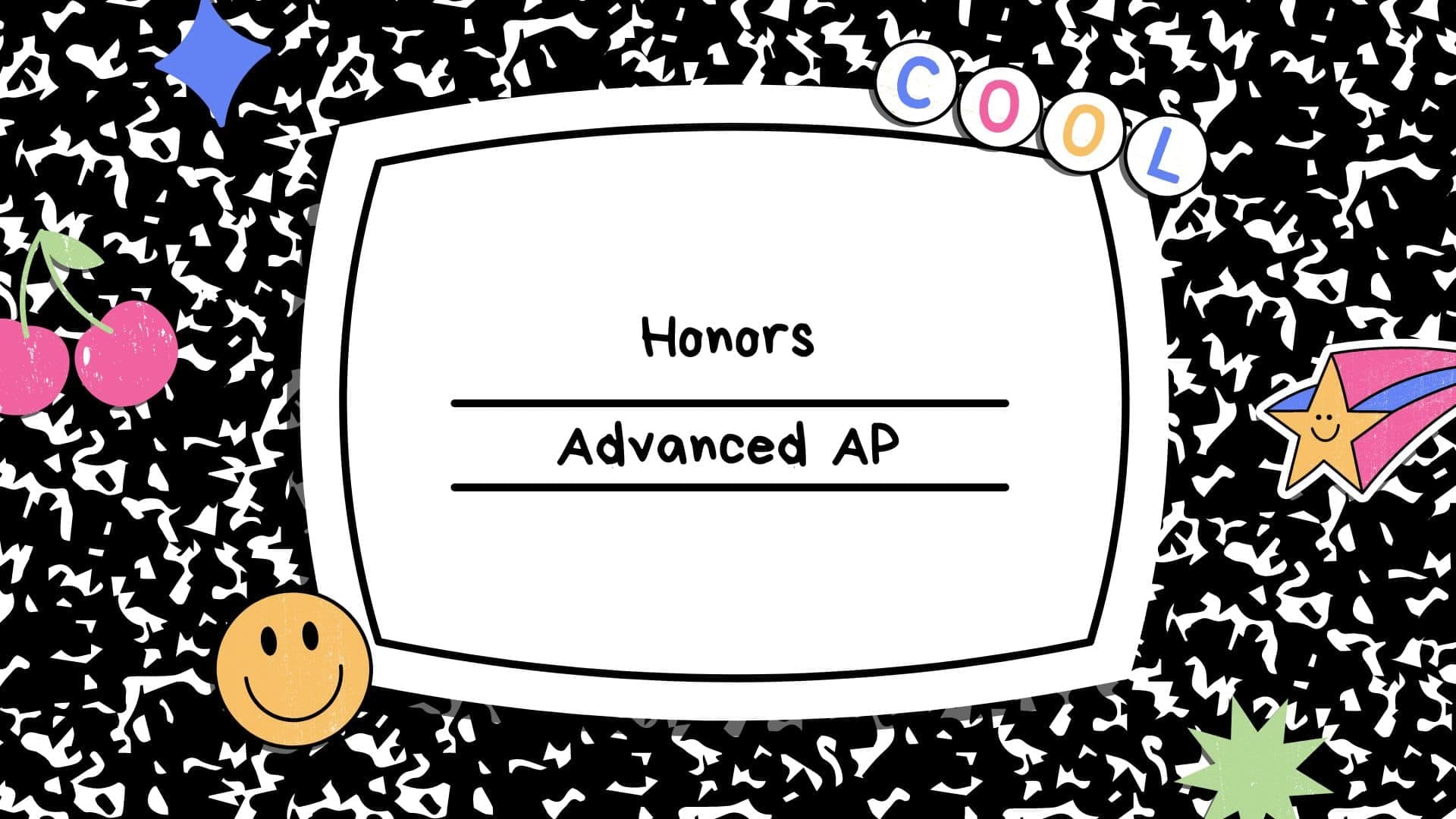
High school is a pivotal time in a student’s academic journey, setting the stage for future success in college and beyond. One crucial aspect of this journey is the selection of courses. The courses you choose can significantly impact your academic experience, influencing everything from your learning style to future opportunities.
In advanced high school courses, students often encounter terms like “Honors,” “Advanced,” and “AP” without fully understanding their differences. These designations represent varying levels of rigor and academic challenge. Honors courses typically offer a more in-depth exploration of subject matter than standard courses. In contrast, Advanced Placement (AP) courses go even further, providing college-level material and the opportunity for college credit through AP exams.

A 2024 National Center for Education Statistics report found that over 60% of high schools in the U.S. now offer AP courses. However, with abundant advanced course options, navigating the differences between Honors, Advanced, and AP can be confusing. Let’s break down the key distinctions in curriculum, teacher involvement, and assessment strategies.
Consider curriculum and difficulty as the depth and speed of your learning journey.
Honors courses typically cover more material than standard courses at a faster pace. Advanced courses might be similar in intensity, but the curriculum may vary depending on your school or teacher.
AP classes, however, are on a whole other level. Designed to mimic college coursework, AP classes delve deeply into challenging topics, often requiring significant independent study and critical thinking.
Your teacher’s role and your self-reliance level also differ across these categories. Honors and Advanced classes often involve more teacher guidance and support. Instructors might provide additional 1explanations, break down complex concepts, and offer more structured learning experiences.
In contrast, AP courses are designed to foster student independence. Teachers will still provide instruction, but students are expected to take more initiative in their learning, actively engaging in research, analysis, and self-directed study.
Grading and assessment strategies also vary. All three types of courses will likely involve rigorous assessments like essays, quizzes, and projects.
However, AP courses often culminate in a standardized exam the College Board administers. These exams assess your understanding of the entire year’s material and can potentially earn you college credit, giving them an added layer of importance.
Deciding on the right course level is crucial. Let’s explore the advantages and disadvantages of advanced classes to help you make an informed choice.
Advanced courses offer a clear advantage: a stronger academic foundation. A 2023 National Bureau of Economic Research study found that students who took rigorous high school courses were more likely to graduate from college within four years. This deeper understanding prepares them for the demanding workload and critical thinking required in college.
Another perk is potential college credit. AP courses allow students to take exams that can translate into college credit if they score well. This saves time and money, allowing them to graduate earlier and potentially reduce tuition costs.
Additionally, many high schools award weighted grades for advanced courses. A B grade in an AP class might count as an A towards your GPA, potentially boosting your overall academic standing.
However, advanced courses aren’t without challenges. The increased workload and faster pace can be stressful, leading to burnout for some students. It’s important to be realistic about your time management and study skills.
Another drawback is the potential impact on your GPA. Struggling in a demanding course could lower your GPA, affecting college admissions decisions.
Ultimately, deciding to take advanced courses depends on your learning style, academic goals, and ability to handle pressure.
Choosing the right courses can feel overwhelming, but a little self-reflection can make a big difference. Here’s how to navigate your options and find the perfect fit.
Know Your Learning Style: Do you learn best by diving deep into complex topics or prefer a step-by-step approach with clear instructions? Many schools offer resources to help you identify your learning style.
Consider Your Goals: Are you aiming for a challenging college known for its rigorous academics? Or are you more interested in a specific career path (e.g., working in addiction recovery) or exploring a field in science, technology, engineering, or math (STEM)?
Don’t go it alone! Your teachers and guidance counselor are there to help.
Talk to Your Teachers: They know your strengths and weaknesses in their subject areas, including your readiness for advanced math courses like Calculus AB and BC, and can recommend courses that will challenge you appropriately.
Meet with Your Counselor: Counselors are trained to help students plan their academic careers. They can guide you on course selection based on your interests and goals and ensure you’re on track to graduate and meet any college entrance requirements.
While taking challenging courses is great, it’s important not to overload yourself.
Consider Your Workload: Factor in your extracurricular activities like sports or clubs when planning your course schedule.Don’t Forget Your Wellbeing: A healthy balance between academics and personal life is crucial for success. Feeling stressed and burnt out can negatively impact your grades in all your classes.

While AP courses are a popular option for high school students seeking a challenge, they’re not the only path to success. Here are some exciting alternatives to consider:
Do you crave a taste of college life while still in high school? Dual enrollment programs allow you to take college-level courses at a local community college or university. These courses offer several benefits:
Many high schools offer advanced electives that delve deeper into specific subjects, providing a compelling alternative to AP classes. These courses can be just as challenging but often focus on specific areas within a broader subject (e.g., Marine Biology within the field of Biology).
Consider these advantages:
Colleges value students with a well-rounded academic background and a genuine love of learning. Don’t feel pressured to overload on AP classes just for the sake of it.
Focus on building a transcript that showcases your strengths and interests. This could include challenging core classes, advanced electives you’re passionate about, and even foreign language courses.
A strong record built on various subjects can be just as impressive as a transcript filled with AP classes.
Selecting the right courses in high school is a critical decision that can shape your academic journey and future opportunities. Consider your learning style, goals, and interests when choosing between Honors, Advanced, and AP courses.
As you navigate the world of advanced high school courses, remember to prioritize balance, seek guidance from teachers and counselors, and explore alternative avenues for academic success.
Choosing courses that challenge and inspire you makes you well-equipped to achieve your goals and excel in high school and beyond.

We’ve tracked down the acceptance rates of some of the easiest colleges to apply for in the country, so you don’t have to. With special sections for CA, FL, TX, and NY. Read on to find out more.

Do you have a 3.5 GPA? Are you curious about which schools you have a good chance of getting into with a 3.5 GPA? There are numerous options from prestigious institutions to high-ranked liberal arts colleges. The opportunities are endless and in this blog, we will explore these colleges and universities, explore strategies on how …

If you’ve always been fascinated by the mysteries of the ocean and dream of exploring marine ecosystems, a career in marine biology might be perfect for you. Studying marine biology offers the unique opportunity to observe animal behaviors, understand the health of our oceans, and explore the connections between humans and marine life. Graduates can …